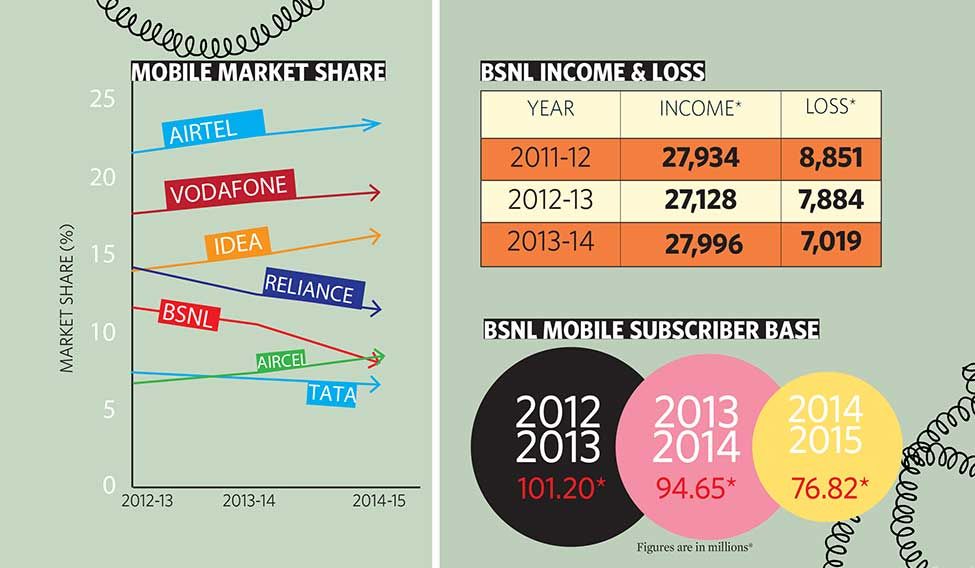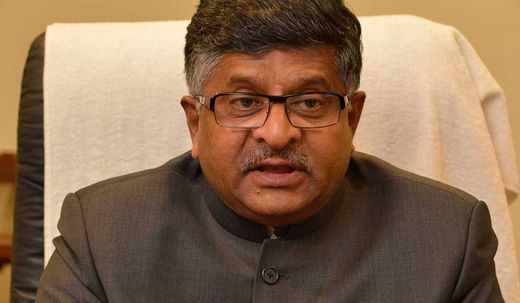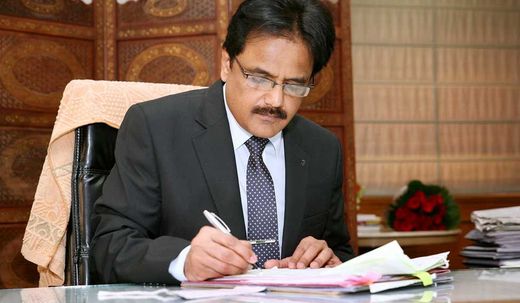In 2010, when Sam Pitroda tried to hire a chief executive officer for Bharat Sanchar Nigam Ltd, he had no clue it would turn out to be a wild-goose chase. Nobody who met his criteria was interested in the post. He even sent feelers to some friends, but in vain. Later, he was told, it was not the salary or the health of the company, but the lack of freedom to take decisions that stopped people.
BSNL could very well be a B-school case study on how a profit-making public sector company was reduced to zilch by a clutch of greedy ministers and employees. When a former director in BSNL recently complained to a general manager about some problems with his own connection, the GM told him that he was free to “port out”. The director was aghast at the apathy.
The lack of concern is evident from top to bottom in the company. Its mobile customer base came down from 94.65 million in 2013-2014 to 76.82 million in 2014-2015. About 31 lakh unresolved complaints had piled up till this January. A report by the Telecom Regulatory Authority of India on quality of service says BSNL performed poorly on call drops. The non-functional towers are to blame for this. Of 65,000 towers BSNL owns, 1,689 are not working at all.
Not surprisingly, its market share in the mobile segment came down from 11.7 per cent in 2012-13 to 10.5 per cent in 2013-14. In 2014-15, it stands at 8 per cent. In broadband, it has the third largest market share, after Bharti Airtel and Vodafone. But the position seems to be slipping from its hands, as its market share came down from 16.1 per cent on 2013-14 to 10.6 per cent in 2014-15.
BSNL last registered a profit in 2008-09—of Rs.574.85 crore. For the year ended on March 31, 2014, it posted a loss of Rs.7,019.76 crore. Analysts feel it is unlikely to come back from the brink, given the changed market landscape.
When BSNL was carved out of the telecom department in 2000, it was a crown jewel. By 2004, it had become the second largest telecom firm, after Airtel. In 2005, it had added more subscribers than Airtel, and, by mid-2006, it was within striking distance of the top slot. However, as it was about to take the giant leap, its wings were clipped by the political masters. And, the way it was done is nothing short of a scam.
It is well known that the telecom ministry is a cash cow for the ruling alliance. When Dayanidhi Maran was telecom minister, he allegedly used the BSNL infrastructure to facilitate transmission for his brother’s company, Sun Network. The case is in the Supreme Court.
When Maran resigned in 2007 after a family squabble, A. Raja got his place. BSNL had announced a $5 billion tender for 45.5 million GSM lines to tap into the explosive growth of mobile phones. There were five bidders—Motorola, ZTE, Siemens, Ericsson and Nokia. Motorola was disqualified on technical grounds and the order was placed with the lowest bidders, Ericsson, which got 60 per cent of the contract, and Nokia-Siemens, which got the rest. Motorola, however, moved the Delhi High Court against its disqualification and the order remained pending for seven months. BSNL tried to place the order once again, but by then Maran had resigned and Raja had the mandate of undoing whatever Maran had done.
According to Raja, BSNL and the government would have lost some Rs.100 billion if the tender was placed, as the price of $108 per line quoted by Ericsson was too high. His intervention forced BSNL to halve its contract size, to 22.3 million lines, and negotiate a price of $91 per line with Ericsson. Nokia-Siemens, which had initially quoted $177 per line, was not interested in matching Ericsson's price, and, ultimately, the tender was reduced to just 14 million lines, about a third of the original one. BSNL never recovered from this missed opportunity.
In 2010, BSNL cancelled a 93-million line tender worth 035,000 crore amid allegations that the bidding process lacked competition and the capacity addition was too high for it to handle. Also, the home ministry had objected to its plans to procure equipment from a Chinese company. This was when all major private telecom companies operated equipment from Chinese manufacturers. Though the government allowed it after a few months, the procurement programme was greatly delayed.
“The procedure was killing us,” said S.D. Saxena, former director (finance), BSNL. “By the time the tender came to the market, technology would become obsolete. We should have done what other operators were doing; that is, following the limited tender route.”
Vendors are said to have played a major role in tender cancellations. They were part of a lobby that had direct access to the telecom minister. While the minister would not explicitly favour a vendor, sources say, the specifications were changed to suit a few.
And, vendors often quoted unrealistic prices, just to bag the tender. Then the competitor would file a case delaying the entire process. Network equipment tenders were cancelled 13 times between 2007 and 2010. “Those were the peak days of mobile expansion,” said Saxena. “At that time, when everybody was adding 10 million lines, we could not even buy equipment. The network was choked. As a result, service quality became poor and customers started shunning us,” said Saxena.
 Graphics: Deni Lal
Graphics: Deni Lal
Political interference in tenders, however, was nothing new for BSNL. In July 2001, when BSNL tried to float its first tender for GSM lines worth Rs.3,000 crore, telecom minister Pramod Mahajan objected. “Just when we were about to issue the advance purchase order, Mahajan said the rates were very high and needed negotiations. The price came down a bit but the purchase order could be issued only after 100 days. Delay in getting the equipment meant that BSNL was losing Rs.2 to Rs.3 crore a day,” said a source who was involved in the process at that time.
At BSNL, there has always been immense political pressure on honest officers. A deputy director general (mobile) was transferred to Patna during Raja’s tenure just because he refused to change specifications in a tender. The vendor lobby had become so powerful that they were deciding posting and positions of officers. It was easier being corrupt than being honest. This year, 163 corruption cases have been reported in BSNL. The number of cases was 1,191 in 2014 and 1,097 in 2013.
In 2008, BSNL planned to launch WiMax services to deliver data at high speed, over greater distances and for a greater number of users. Its rollout was to be done on the franchise model. Raja said the model would involve less investment from BSNL. Apparently, that was not the only reason.
The allocation of franchises for WiMax ran into controversy over alleged favouritism. In 2009, BSNL was forced to cancel the tender for awarding WiMax after its own investigations revealed that five of the six shortlisted companies were just fronts for certain individuals.
The next round of franchise selection for WiMax was in 2010. Though there was bidding, Raja allegedly ensured that his favoured vendor got a piece of the pie. Star Net Communications, which is said to be owned by a friend of Raja's, bagged licence for six circles, despite failing to meet the specifications and allegations of fudging its balance sheet.
“The address given was false and it did not have a turnover of Rs.100 crore during the previous two financial years,” said Prasanta Chatterjee, former member of Parliament. “On August 30, 2010, several members of Parliament wrote to the prime minister to demand an inquiry. It was followed by two more letters.” The CBI is probing the matter. The agency estimates a “wrongful loss of approximately Rs.535.50 crore” for BSNL because of the deal.
WiMax was just one of the many bungled projects in BSNL. In May 2007, it decided to deploy GPON (Gigabit Passive Optical Network) technology through optical fibre cable to provide voice, data and video services. The estimated cost of the project was Rs.1,150 crore and it was to be internally funded. BSNL placed purchase orders for Rs.1,119.73 crore in May 2009. Soon the procurement plan was raised from 32,000 lines to 7 lakh lines. But this was done without studying the demand for the services the technology provided. BSNL could get only 22,778 customers, just a fraction of 18.32 lakh customers it targeted, by December 2010. The Central Vigilance Commission is investigating the case.
That BSNL enjoys favour while the government makes policies is a myth. In fact, often it is the other way round. The company used to get access deficit charge (ADC) to compensate for services on which it does not recover cost of operation, such as telecom services in rural areas, local call charges and provisions for free calls. It was scrapped in 2008 and the government decided that BSNL be paid a one-time amount in lieu of that. The first tranche, of Rs.1,500 crore, has been given. But the second tranche, of Rs.1,250 crore, is yet to be received.
Similar has been the case with Universal Services Obligation Fund, where all telecom operators had to contribute a certain percentage of their top line. Telecom companies were paid from USOF under various schemes, such as rural broadband or connections in LWE areas. Here again, BSNL has paid much more than it has got. For 2014-15, it paid Rs.978 crore to the government while it received only Rs.138 crore.
When the 3G spectrum was auctioned in 2010, BSNL was given a pan-India licence. It had to match the second highest bidder in each circle, which meant an outgo of Rs.10,186.52 crore. Private operators, on the other hand, had the option of choosing circles. They circumvented the circle restrictions by striking intra-circle roaming agreements among themselves. The amount they thus avoided paying to the government is estimated to be around Rs.20,000 crore. Telecom department has found these pacts to be a violation of the licence agreement. The case is in the Supreme Court.
“Since BSNL has spectrum in almost all circles, the government could have easily cashed in on it by allowing private operators to roam on BSNL’s network. Their warped thinking, however, made them lose at least Rs.10,000 crore,” said B.K. Syngal, former chairman of Videsh Sanchar Nigam Ltd.
A large part of the damage to BSNL has been done by its demotivated Indian Telecom Service cadre. When BSNL was formed, these officers were moved to the company on permanent deputation. They have been fighting an absorption into BSNL because moving up the pay scale is more difficult in the company than in government service. “All top positions in BSNL are occupied by ITS officers. They continue to be in the government service and are on deputation to BSNL. At present, the career prospects of the top management officers are not related to the growth of BSNL but with the government,” said V.A.N. Namboodiri, general secretary, BSNL Employees' Union.
In fact, the work force is one of the biggest challenges before BSNL. According to its latest annual report, it has 2,38,277 employees. Airtel, which has more subscribers and reach, has less than 25,000 employees. Last year, BSNL spent Rs.15,435.84 crore on salary, gratuity and medical expenses—about 55 per cent of its total income of Rs.27,996.35 crore. Ironically, despite this, the company faces a shortage of field staff for repair and maintenance, a reason for deterioration in customer service.
Pitroda, the man behind India's telecom revolution, was asked to suggest ways to revive BSNL. He recommended disinvesting 30 per cent stake through a strategic investor and an initial public offering, of which 10 per cent should be returned to the government and 20 per cent be used for voluntary retirement of employees, expansion and operations. He also recommended completing the ITS absorption while inducting young talent in technology, IT, marketing and sales. His recommendations, however, failed to cut much ice with the telecom commission.
“There are too many people trying to scuttle things in the government,” said Pitroda. “We gave the report in 30 days. In the government, the real crisis is crisis of people.” He said prime minister Manmohan Singh wanted it. “He had told me that we needed to get this done. But the responsibility of implementing it lies with the board. The board should have been able to stand up,” he said.
Experts say merging BSNL and MTNL could be the first step towards revamping the public sector unit. “There are synergies between the two which can be tapped and there is no reason why one PSU in the same sector should be paying charges to another,” said Milind Deora, former minister of state for communications and IT.
A revival plan, in fact, is on at BSNL. It has started shifting its fixed line customers to Next Generation Network. The technology provides both fixed line and broadband from the same telephone exchange. The company expects to reduce customer attrition and increase average revenue per user by this move. It is also augmenting its GSM network by 15 million lines.
That, however, is just a beginning. “Just because you have gone to the doctor does not mean that you have gone to the right one,” said Mahesh Uppal, director, Com First India, a consultancy firm. “BSNL needs some market-savvy people to work on a revival plan. The government deciding top down is a poor substitute.”

Interview/ Ravi Shankar Prasad, minister for communication
BSNL will ensure fair competition
What are you doing to revive BSNL?
After I took over, the first thing I had to do was to change the image of Sanchar Bhawan. Today, one year down the line, I can happily say that the corridors of Sanchar Bhavan are free from middlemen. The biggest landmark was the auction of spectrum. It was done fairly and 01,10,000 crore was received. A lot of other initiatives are going on. I have encouraged the BSNL board to be proactive. They have plans to instal about 2,500 BTS towers. Six hundred telephone exchanges are going to be converted to next generation network. As a result of our various measures, 47 lakh new customers have been added.
By when do you expect results?
I will never say that things have improved. But, from a very critical shape, things have started to improve. I feel strongly that for a fair competition to happen, a public body must stay. In the coming year, things will improve substantially. It is a cancerous past of so many years. You will have to give them some time.
There are many CBI cases related to BSNL.
My take is, whatever cooperation the CBI needs will be given. Under my tenure, the conduct will be fair, but I have to address a lot of legacy issues.

Interview/ Anupam Shrivastava, chairman and managing director, BSNL
We missed the voice bus
Aren't you late to think about a revival plan?
As far as voice is concerned, yes, we have missed the bus. If you look at mobile communication development in the country, the first phase was about growth in the voice segment and now it is data. BSNL entered the mobile segment in 2002, almost 3-4 years after private operators were allowed. From 2002 to 2006, we were doing very well for the simple reason that we were getting equipment on time. From 2006 to 2012 however, we could not add sufficient equipment to the network. This was the period when market was expanding very fast and that's when we missed the voice bus.
What caused the problems?
There were various reasons. Our tenders were not successful, there were legal cases, vendor rivalry and various other factors. Also, political environment was such that we could not expand.
What are your plans for revival?
We are right now in phase seven of expansion. The next growth in mobile communication is going to come from data. Our huge optical fibre network could be utilised for data penetration. We are actively pushing for Wi-Fi. We do not have 4G licence, but we are integrating Wi-Fi with our 2G and 3G network. We have touched 300 Wi-Fi networks and plan to complete 2,500 Wi-Fi hotspots by the end of this financial year. We don't want to miss the data bus. There are plans to put 40,000 hotspots to counter 4G.







